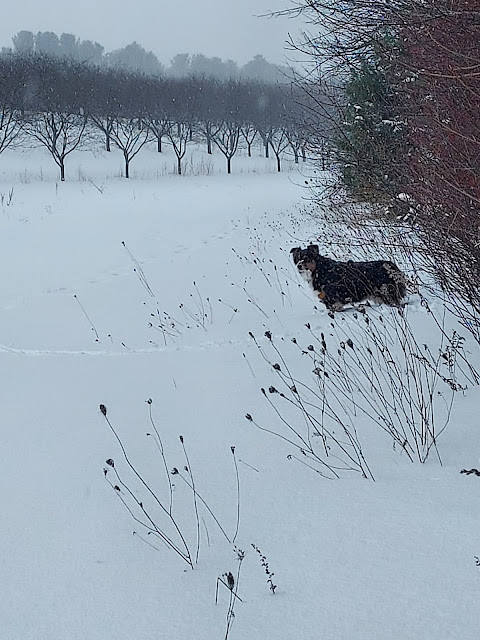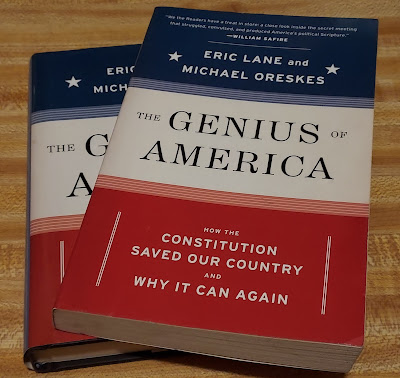 |
| Winter is all around us. |
A friend of mine goes places in her car in winter in her indoor clothes, adding only a down vest. No gloves or mittens. No knitted cap. No heavy jacket. “I’m in the car!” she tells me. I ask her, “What if you had car trouble?” and she replies, “I would use my cell phone!”
 |
| So wiper blades don't freeze to windshield overnight.... |
By contrast, I am not only layered up for driving but have an extra pair of work gloves with me in case I need to, say, open the hood—or get that shovel out of the back of the car to dig myself out of a snowbank—or whatever! Yes, I have a shovel with me. (No sandbags, but I figure I could use the car’s floormats, if necessary. Sandbags are very heavy.) Also engine oil, windshield wiper fluid, antifreeze, flashlight, and jumper cables. The bottle of drinking water, for myself and my dog, if she happens to be with me, has to come in the house overnight, or it would be just a bottle of ice, and who needs that in an emergency? (Note to self: Put blanket in car!) I take my clue from the old Tom Lehr song, “Be Prepared!”
On the evening of the day of his state funeral, I began reading Jimmy Carter’s memoir, Keeping Faith, about his years in the White House. I have had the book for several years but hadn’t read it because, while I have always loved Jimmy, I am usually bored by political memoirs. Too many big names, too many dates, generally not much that is personal, not much to give me insight into the writer’s personality and character.
I’m happy to say that Carter’s book is very different. For one thing, he wrote it himself. It isn’t the work of a ghost writer. For another, he begins at the end, leading off with the most painful episode of his presidency, the hostage crisis. How many presidents would ever have done that? In the first pages of his memoir, he shows himself at his most vulnerable. And, of course, by then he has already lost his bid for re-election, so as the hostages are being released, he is onstage at the inauguration of his successor, Ronald Reagan. Hardly a moment of glory for Carter. But he had done the work, and the hostages were freed and came home alive.
He was never one to take shortcuts or “fake it,” in any of his life roles. He took the job of president of the United States seriously, writing of his preparation:
From the beginning, I realized that my ability to govern well would depend upon my mastery of the extremely important issues I faced. I wanted to learn as much as possible…. (p. 57 of the Easton Press edition)
In his first campaign for the presidency, coming to national politics from the governorship of Georgia, Carter was so confident that he would win the White House that many called him overconfident. Yet he wrote that his “freedom to act and speak during the campaign was severely restrained by the same confidence.” What could that mean? How and why would confidence of victory restrain his freedom to act and speak? Precisely, again, because he took so seriously the job of president.
I ran as though I would have to govern—always careful about what I promised and determined not to betray those who gave me their support. Sometimes I irritated my opponents and the news reports by firmly refusing to answer to questions to which I did not know the answers. And repeatedly I told reporters, ‘If I ever lie to you, if I ever make a misleading statement, don’t vote for me. I would not deserve to be your president.’ Even during the earliest days I was always thinking about what would have to be done in the Oval Office after the inauguration ceremonies were over. (p. 65)
It drove reporters crazy that he would occasionally “I don’t know” to a question. What he needed to know, he worked to find out. What he couldn’t know ahead of time, he admitted. But always, as he campaigned for the highest office in the land, he prepared himself not only to win but to govern.
My life is ever so much simpler. I prepared for winter with snow tires, a new furnace, and a refill of my propane tank. Good thing, because in keeping with yo-yo weather patterns of recent months, our temperate winter weather over the holidays in northern Michigan has now given way to January temperatures in the ’teens, with single-digit wind chill (or “feels like”) readings.
 |
| We have wind chill! |
("When I was a kid," I used to tell my son, "we didn’t have wind chill!" That is, of course, we didn’t have a name for it. What would the word ‘rose’ name if there were no more roses?)
 |
| She doesn't mind snow or cold. |
Dogs, though. A dog is like the legendary postman: Whatever the weather, out we go, and little does Sunny Juliet suspect how slight is her dog mom’s inclination for outdoor adventures in a punishing, sub-freezing northwest wind, sun perpetually hidden above low-hanging clouds of depressing gunmetal grey! I make my voice enthusiastic and let her watch me load my pocket with treats....
 |
| She doesn't mind at all. |
Every day of our human lives, in one way or another, we are preparing for days to come, aren’t we? For me, Sunday was housework (an attempt to keep entropy at bay), Monday paperwork (getting ready for tax time), and Tuesday an early morning expedition, sans dog, to Leland to have a new (working) headlight installed, which gave me an opportunity while my car was at Van’s Garage to have coffee and breakfast in what was formerly the Early Bird (now Great Lakes Chocolate & Café) and to sit in the very corner where the Artist and I sat so many, many mornings in past years.
 |
| View from the "bus driver's seat" -- |
The restaurant has not been the Early Bird for a long time, but after we moved from the village of Leland out to Leelanau Township in 2021, the Early Bird routine was no longer part of our lives, and more recent incarnations of the place never really registered on my radar. Anyway, the building has the same configuration, and the view from what the Artist used to call the “bus driver’s seat” (no booths now, but I hitched my chair around to face north) is pretty much the same. I should have been prepared for the flood of memories, but the emotions caught me off-guard.
Then, home to books and dog! I am so lucky to have a warm, sheltering home and a lively, affectionate little companion! I still inhabit the life the Artist and I made together, and Wednesday will find me back in Northport, on Waukazoo Street, in my other little world, surrounded by books.
 |
| Be prepared! |


































